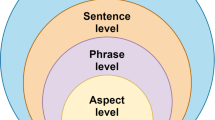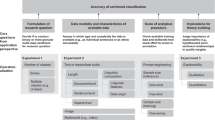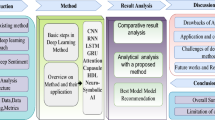Abstract
Aspect-oriented extraction involves the identification and extraction of specific aspects, features, or entities within a piece of text. Traditional methods often struggled with the complexity and variability of language, leading to the exploration of advanced deep learning approaches. In the realm of sentiment analysis, the conventional approaches often fall short when it comes to providing a nuanced understanding of sentiments expressed in textual data. Traditional sentiment analysis models often overlook the specific aspects or entities within the text that contribute to the overall sentiment. This limitation poses a significant challenge for businesses and organizations aiming to gain detailed insights into customer opinions, product reviews, and other forms of user-generated content.In this research, we propose an innovative approach for aspect-oriented extraction and sentiment analysis leveraging optimized hybrid deep learning techniques. Our methodology integrates the powerful capabilities of deep learning models with the efficiency of Reptile Search Optimization. Furthermore, we introduce an advanced sentiment analysis framework employing the state-of-the-art Extreme Gradient Boosting Algorithm. The fusion of these techniques aims to enhance the precision and interpretability of aspect-oriented sentiment analysis. The proposed approach first utilizes deep learning architectures to extract and comprehend diverse aspects within textual data. Through the incorporation of Reptile Search Optimization, we optimize the learning process, ensuring adaptability and improved model generalization across various datasets. Subsequently, the sentiment analysis phase employs the robust Extreme Gradient Boosting Algorithm, known for its effectiveness in handling complex relationships and patterns within data. Our experiments, conducted on diverse datasets, demonstrate the superior performance of the proposed methodology in comparison to traditional approaches. The optimized hybrid deep learning approach, coupled with the Reptile Search Optimization and Extreme Gradient Boosting Algorithm, showcases promising results in accurately capturing nuanced sentiments associated with different aspects. This research contributes to the advancement of aspect-oriented sentiment analysis techniques, offering a comprehensive and efficient solution for understanding sentiment nuances in textual data across various domains. The ResNet 50 and EfficientNet B7 architecture of the modified pre-trained model is proposed for the aspect extraction function. The Reptile Search Optimization based Extreme Gradient Boosting Algorithm (RSO-EGBA) is proposed to analyze and predict customer sentiments. The execution of this study is carried out using python software. It has been observed that the overall accuracy of our proposed method is 99.8%, while that of the other state-of-the-art. The overall accuracy of our proposed method shows an increment of 9–16% from that of the state-of-the-art methods.










Similar content being viewed by others
Availability of data and material
Data sharing is not applicable to this article as no new data were created or analyzed in this study.
Code availability
Not applicable.
References
Cheng X et al (2019) An investigation on online reviews in sharing economy driven hospitality platforms: A viewpoint of trust. Tour Manag 71:366–377
Li L, Goh T-T, Jin D (2020) How textual quality of online reviews affect classification performance: a case of deep learning sentiment analysis. Neural Comput Appl 32:4387–4415
Singh V, Thurman A (2019) How many ways can we define online learning? A systematic literature review of definitions of online learning (1988–2018). Am J Distance Educ 33(4):289–306
Pei L, Hongbin Wu (2019) Does online learning work better than offline learning in undergraduate medical education? A systematic review and meta-analysis. Med Educ Online 24(1):1666538
Park E et al (2020) Understanding customers’ hotel revisiting behaviour: a sentiment analysis of online feedback reviews. Curr Issues Tour 23(5):605–611
Lawani A et al (2019) Reviews and price on online platforms: Evidence from sentiment analysis of Airbnb reviews in Boston. Reg Sci Urb Econ 75:22–34
Shafin MA, Hasan MM, Alam MR, Mithu MA, Nur AU, Faruk MO (2020) Product review sentiment analysis by using nlp and machine learning in bangla language. In: 2020 23rd International Conference on Computer and Information Technology (ICCIT). IEEE, pp 1–5
Abualigah L et al (2020) Sentiment analysis in healthcare: a brief review. In: Recent advances in NLP: the case of Arabic language, pp 129–141
Li L et al (2022) Key factors in MOOC pedagogy based on NLP sentiment analysis of learner reviews: What makes a hit. Comput Educ 176:104354
Tiwari S et al (2020) Social media sentiment analysis on Twitter datasets. In: 2020 6th international conference on advanced computing and communication systems (ICACCS). IEEE
Zunic A, Corcoran P, Spasic I (2020) Sentiment analysis in health and well-being: systematic review. JMIR Med Inform 8(1):e16023
Nandal N, Tanwar R, Choudhury T, Satapathy SC (2020) Context driven bipolar adjustment for optimized aspect level sentiment analysis. J Sci Ind Res 79(2):122–127
Yadavilli VS, Seshadri K (2021) A survey on aspect extraction approaches for sentiment analysis. In: Data preprocessing, active learning, and cost perceptive approaches for resolving data imbalance. IGI Global, pp 42–65
Wang Y et al (2021) Aspect-level sentiment analysis based on gradual machine learning. Knowl-Based Syst 212:106509
Guo X et al (2020) Multi-way matching based fine-grained sentiment analysis for user reviews. Neural Comput Appl 32:5409–5423
Nandal N, Tanwar R, Pruthi J (2020) Machine learning based aspect level sentiment analysis for Amazon products. Spat Inf Res 28:601–607
Abugharsa A (2021) Sentiment analysis in poems in misurata sub-dialect--a sentiment detection in an Arabic sub-dialect. arXiv preprint arXiv:2109.07203
Us Sahar N, Irshad MS, Khan MA (2019) Bayesian sentiment analytics for emerging trends in unstructured data streams. EAI Endorsed Trans Scalable Inf Syst 6(22):e5
Ma D, Chen Q, Yang C (2022) Aspect-level sentiment analysis research based on XLN et-LCF. In: 2022 International Conference on Frontiers of Artificial Intelligence and Machine Learning (FAIML). IEEE
Liu Y et al (2020) ALSA: adversarial learning of supervised attentions for visual question answering. IEEE Trans Cybernet 52(6):4520–4533
Ozyurt B, Ali Akcayol M (2021) A new topic modeling based approach for aspect extraction in aspect based sentiment analysis: SS-LDA. Exp Syst Appl 168:114231
Al-Dabet S, Tedmori S, Mohammad AL-S (2021) Enhancing Arabic aspect-based sentiment analysis using deep learning models. Comput Speech Lang 69:101224
Ray P, Chakrabarti A (2022) A mixed approach of deep learning method and rule-based method to improve aspect level sentiment analysis. Appl Comput Inform 18(1/2):163–178
Ombabi AH, Ouarda W, Alimi AM (2020) Deep learning CNN–LSTM framework for Arabic sentiment analysis using textual information shared in social networks. Soc Netw Anal Min 10(53):1–13
Majumder N et al (2022) Improving aspect-level sentiment analysis with aspect extraction. Neural Comput Appl 1–11
Venugopalan M, Gupta D (2022) An enhanced guided LDA model augmented with BERT based semantic strength for aspect term extraction in sentiment analysis. Knowl-Based Syst 246:108668
Huang B et al (2022) Aspect-level sentiment analysis with aspect-specific context position information. Knowl-Based Syst 243:108473
Alamoudi ES, Alghamdi NS (2021) Sentiment classification and aspect-based sentiment analysis on yelp reviews using deep learning and word embeddings. J Decis Syst 30(2–3):259–281
Funding
Not applicable.
Author information
Authors and Affiliations
Corresponding author
Ethics declarations
Human and animal rights
This article does not contain any studies with human or animal subjects performed by any of the authors.
Informed consent
Informed consent does not apply as this was a retrospective review with no identifying patient information.
Consent to participate
Not applicable.
Consent for publication
Not applicable.
Conflict of interest
The authors declare that they have no conflict of interest.
Additional information
Publisher's Note
Springer Nature remains neutral with regard to jurisdictional claims in published maps and institutional affiliations.
Rights and permissions
Springer Nature or its licensor (e.g. a society or other partner) holds exclusive rights to this article under a publishing agreement with the author(s) or other rightsholder(s); author self-archiving of the accepted manuscript version of this article is solely governed by the terms of such publishing agreement and applicable law.
About this article
Cite this article
Kotagiri, S., Sowjanya, A.M., Anilkumar, B. et al. Aspect-oriented extraction and sentiment analysis using optimized hybrid deep learning approaches. Multimed Tools Appl (2024). https://doi.org/10.1007/s11042-024-18964-9
Received:
Revised:
Accepted:
Published:
DOI: https://doi.org/10.1007/s11042-024-18964-9




